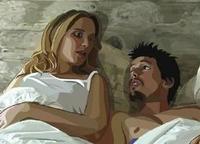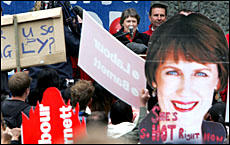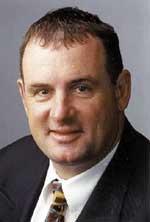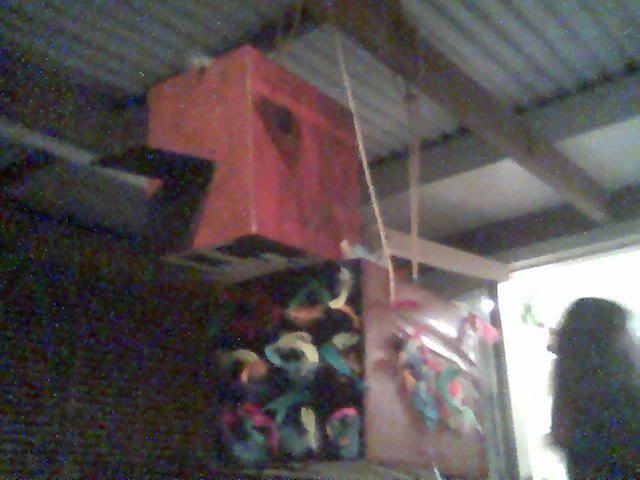I finally got to watch Waking Life on Saturday night, after years of searching for the DVD and then engaging in a subsequent quest for something that would enable my PS2 to play Zone 1 DVDs. What can I say? It was an absolutely mind-bending and enlightening experience, and I still haven't got over that exhilirated feeling that you usually have right after walking out of a really, really good film. I knew that Waking Life was going to be right up my alley -- but I didn't think it was going to be this much up my alley. Seeing the film has even opened up a score of new alleys, however clunky and worn-out a metaphor that is. It has served to increase my awareness of how I specifically view the world, and in doing so has obviously changed my life.
Although I hardly dream as much as I used to -- either that or I simply don't remember them -- the dreams that I have had over the past three years have consistently been lucid ones. I've always embraced that lucidity. It has been enjoyable and practical, probably moreso the latter. For those of you who don't know, a lucid dream is a dream within which you have complete control over your own actions. This control is achieved through the actual realisation and comprehension of the fact that you are dreaming. Once you recognise that you are dreaming and that consequently you are consciously outside of the normal constraints of time and space, you can just go for it and do absolutely whatever.
One of the most significant advantages that I have found lucid dreaming provides, is that nightmares need no longer be scary. However, they will still sometimes be disturbing because of misfortune that other characters within the nightmare experience; or, as I usually find, because of indescribably gory imagery. My nightmares are the first environment in which I started dreaming lucidly. However I did not consciously train myself as I did not think it was possible. Rather, the heightened state of awareness within dreams just sort of came to me.
Since then I have found that relatively shortly after the beginning of a dream, I can discern from various factors that I am in fact dreaming and thus make myself conscious of that fact. The factors that I speak of are usually in the form of blatant inconsistencies with how things are in our waking lives. For example, the light switch example discussed in the film has always been an indicator for me personally. In my dreams I have never, ever been able to turn the lights on or off. I had thought for years that this was merely a personal quirk in my own dream state. To hear it discussed in the film was quite mindblowing indeed.

It is invaluable to be able to achieve a state of lucid dreaming, especially within a bad dream. Awareness of the fact that I am dreaming has, I have found, actually afforded me the ability to wake myself up at any moment of my choosing. If a dream is progressing in a direction with which I am uncomfortable, or if I am about to experience some circumstance of extreme misfortunate within the dream, I am able to open my eyes for a second time. It is a surreal feeling. In the context of my dreaming consciousness, I already have my eyelids open -- but if I concentrate really hard, I can open my eyes for a second time. At that point everything simply dissolves into the alleged reality of my bedroom. I'm sure you can understand that the feeling of opening your eyes again after they are already open is very hard to articulate in writing.
I'm somewhat ashamed to say that that is about as far as I have gone in terms of putting lucid dreaming to a practical use; the avoidance of discomfort. I have not (until seeing Waking Life) properly appreciated the clarity of my consciousness within my dreams, which I realise now could possibly be taken advantage of to explore deeper concepts such as the nature of my being. I've consistently used lucid dreams to do little more than engage in idiotic activities that I could probably pull off fairly easily in alleged reality without getting arrested anyway. One good thing about doing things like that in dreams though, is because your friends never see you doing it and as such cannot hold it against you. After seeing Waking Life I do feel somewhat guilty for abusing my dreams as some sort of playground, though.
The ability to have lucid dreams is a privelege with huge potential for practical use but I have never truely appreciated it. I can comfortably say that Waking Life has changed all that though. I can also totally recommend this film to anybody who hasn't seen it. I think it's fair to say that anyone who has ever stopped for even a second to contemplate the nature of their existence and their consciousness will enjoy this film just as much as I did, if not more. On those particular subjects, I have a lot more to say -- but I think I've articulated enough for one day. Expect more in the future. Also, to those people who have seen Waking Life, it would be very interesting to hear your thoughts on it and how it affected you.
























